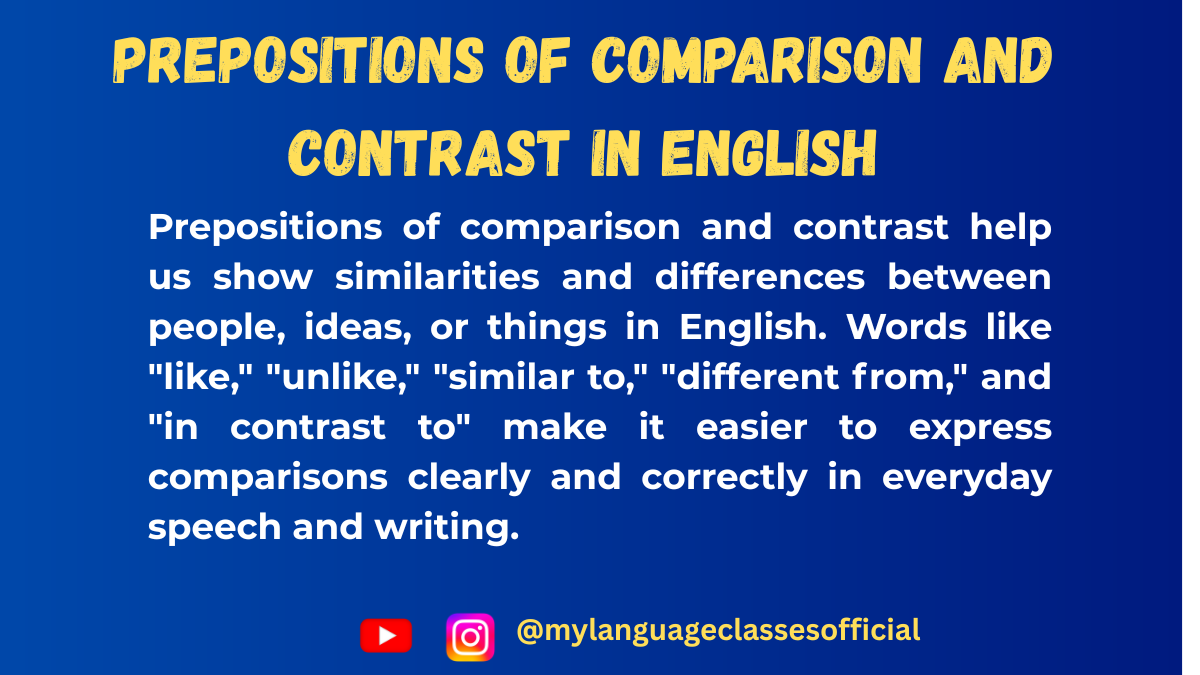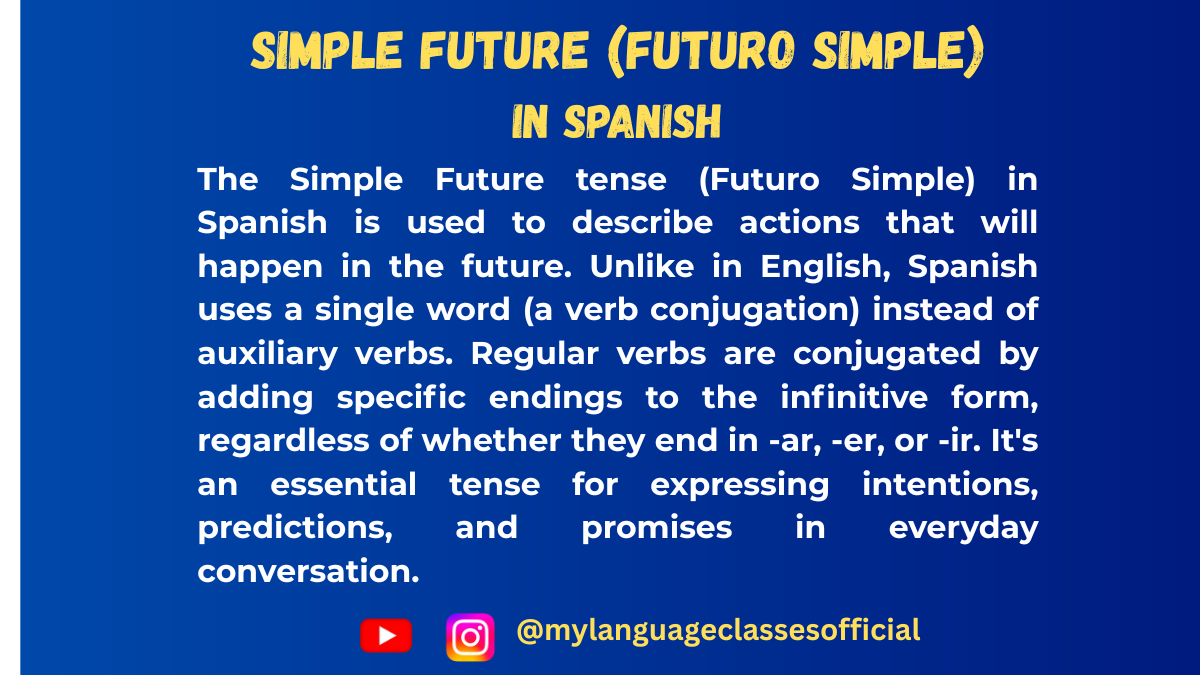Your cart is currently empty!
Tag: My Spanish class
-
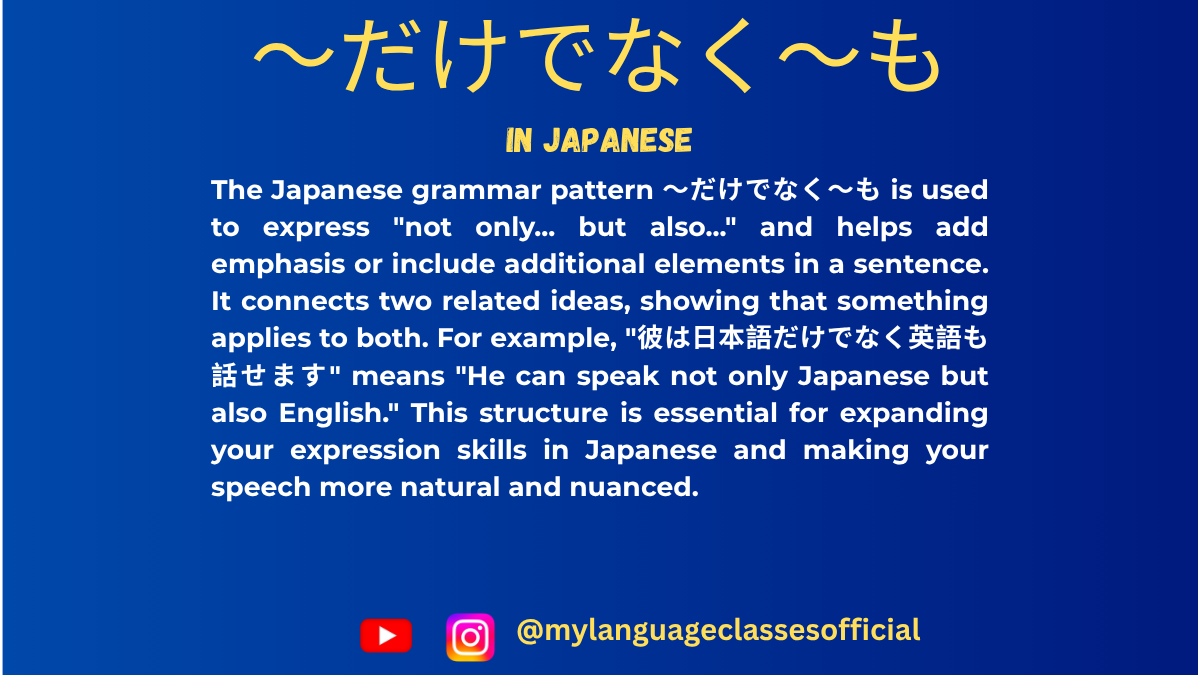
Understanding 〜だけでなく〜も in Japanese | My Language Classes
Using 〜だけでなく〜も in Japanese
In Japanese, the structure 〜だけでなく〜も is a versatile and commonly used grammatical pattern that means “not only… but also…” in English. It is used to emphasize that something is true not just about one thing, but about another as well. This structure is incredibly useful for adding depth and nuance to your sentences, whether you’re talking about nouns, verbs, or adjectives.
For example, if you want to say, “Not only is she smart, but she is also kind,” you would use 〜だけでなく〜も to convey this idea. This blog post will guide you through the formation, usage, and nuances of this structure, along with plenty of examples to help you master it.
Formation of 〜だけでなく〜も
The structure 〜だけでなく〜も can be used with nouns, verbs, and adjectives. Let’s break it down:
1. With Nouns
When used with nouns, the structure is:
Noun + だけでなく + Noun + もExample:
- 彼は先生だけでなく作家でもあります。
(Kare wa sensei dake de naku sakka demo arimasu.)
He is not only a teacher but also a writer.
2. With Verbs
When used with verbs, the structure is:
Verb (dictionary form) + だけでなく + Verb + もExample:
- 彼女は歌うだけでなく踊ることもできます。
(Kanojo wa utau dake de naku odoru koto mo dekimasu.)
She can not only sing but also dance.
3. With Adjectives
When used with adjectives, the structure is:
Adjective + だけでなく + Adjective + もExample:
- この映画は面白いだけでなく感動的でもあります。
(Kono eiga wa omoshiroi dake de naku kandouteki demo arimasu.)
This movie is not only interesting but also moving.
Usage of 〜だけでなく〜も
The 〜だけでなく〜も structure is used in a variety of situations to emphasize that two or more things are true. It can be used in formal and informal contexts, and it works well in both written and spoken Japanese. Here are some common situations where you might use it:
- Highlighting multiple qualities of a person or thing:
- 彼は頭がいいだけでなくスポーツも得意です。
(Kare wa atama ga ii dake de naku supōtsu mo tokui desu.)
He is not only smart but also good at sports.
- 彼は頭がいいだけでなくスポーツも得意です。
- Adding additional information:
- このレストランは安いだけでなく美味しいです。
(Kono resutoran wa yasui dake de naku oishii desu.)
This restaurant is not only cheap but also delicious.
- このレストランは安いだけでなく美味しいです。
- Expanding on actions or abilities:
- 彼は走るだけでなく泳ぐこともできます。
(Kare wa hashiru dake de naku oyogu koto mo dekimasu.)
He can not only run but also swim.
- 彼は走るだけでなく泳ぐこともできます。
Table of Examples
Here’s a table with examples of 〜だけでなく〜も used with nouns, verbs, and adjectives:
Situation Example Sentence (Japanese) Romaji Version English Meaning Noun + だけでなく + Noun + も 彼は医者だけでなく画家でもあります。 Kare wa isha dake de naku gaka demo arimasu. He is not only a doctor but also a painter. この本は面白いだけでなく役に立つです。 Kono hon wa omoshiroi dake de naku yaku ni tatsu desu. This book is not only interesting but also useful. Verb + だけでなく + Verb + も 彼女は料理するだけでなく掃除することも好きです。 Kanojo wa ryōri suru dake de naku sōji suru koto mo suki desu. She not only likes to cook but also likes to clean. 彼は勉強するだけでなく遊ぶことも大切にしています。 Kare wa benkyō suru dake de naku asobu koto mo taisetsu ni shiteimasu. He not only studies but also values playing. Adjective + だけでなく + Adjective + も この町は静かなだけでなく美しいです。 Kono machi wa shizuka na dake de naku utsukushii desu. This town is not only quiet but also beautiful. 彼の話は長いだけでなく退屈です。 Kare no hanashi wa nagai dake de naku taikutsu desu. His story is not only long but also boring.
More Example Sentences
Here are 10 more examples of 〜だけでなく〜も in action:
- 彼は日本語だけでなく英語も話せます。
(Kare wa nihongo dake de naku eigo mo hanasemasu.)
He can speak not only Japanese but also English. - この車は速いだけでなく安全です。
(Kono kuruma wa hayai dake de naku anzen desu.)
This car is not only fast but also safe. - 彼女は歌うだけでなくピアノを弾くこともできます。
(Kanojo wa utau dake de naku piano o hiku koto mo dekimasu.)
She can not only sing but also play the piano. - このアプリは便利なだけでなく無料です。
(Kono apuri wa benri na dake de naku muryō desu.)
This app is not only convenient but also free. - 彼は勉強だけでなくスポーツも得意です。
(Kare wa benkyō dake de naku supōtsu mo tokui desu.)
He is not only good at studying but also at sports. - このレストランは美味しいだけでなく雰囲気も良いです。
(Kono resutoran wa oishii dake de naku funiki mo ii desu.)
This restaurant is not only delicious but also has a good atmosphere. - 彼は走るだけでなく泳ぐこともできます。
(Kare wa hashiru dake de naku oyogu koto mo dekimasu.)
He can not only run but also swim. - この本は面白いだけでなくためになるです。
(Kono hon wa omoshiroi dake de naku tame ni naru desu.)
This book is not only interesting but also informative. - 彼女は優しいだけでなく頭もいいです。
(Kanojo wa yasashii dake de naku atama mo ii desu.)
She is not only kind but also smart. - この公園は広いだけでなく静かです。
(Kono kōen wa hiroi dake de naku shizuka desu.)
This park is not only spacious but also quiet.
Things to Keep in Mind
- Politeness Level: The structure 〜だけでなく〜も can be used in both formal and informal contexts. However, in formal writing or speech, you might want to use 〜のみならず〜も for a more polished tone.
- Order of Information: The first part of the sentence (before だけでなく) is usually the more obvious or expected information, while the second part (after も) adds something unexpected or additional.
- Avoid Overuse: While this structure is useful, overusing it can make your sentences sound repetitive. Use it when you want to emphasize the addition of information.
- Parallel Structure: Ensure that the parts before and after だけでなく are grammatically parallel (e.g., both nouns, both verbs, or both adjectives).
Fill in the Blanks
Here are 10 fill-in-the-blank questions to test your understanding of 〜だけでなく〜も:
- 彼は日本語だけでなく________も話せます。
(Kare wa nihongo dake de naku ________ mo hanasemasu.) - この映画は________だけでなく感動的でもあります。
(Kono eiga wa ________ dake de naku kandouteki demo arimasu.) - 彼女は歌うだけでなく________こともできます。
(Kanojo wa utau dake de naku ________ koto mo dekimasu.) - この本は________だけでなく役に立つです。
(Kono hon wa ________ dake de naku yaku ni tatsu desu.) - 彼は走るだけでなく________こともできます。
(Kare wa hashiru dake de naku ________ koto mo dekimasu.) - この町は________だけでなく美しいです。
(Kono machi wa ________ dake de naku utsukushii desu.) - 彼は勉強だけでなく________も得意です。
(Kare wa benkyō dake de naku ________ mo tokui desu.) - このアプリは________だけでなく無料です。
(Kono apuri wa ________ dake de naku muryō desu.) - 彼女は優しいだけでなく________です。
(Kanojo wa yasashii dake de naku ________ desu.) - この公園は________だけでなく静かです。
(Kono kōen wa ________ dake de naku shizuka desu.)
Answers:
- 英語 (eigo)
- 面白い (omoshiroi)
- 踊る (odoru)
- 面白い (omoshiroi)
- 泳ぐ (oyogu)
- 静か (shizuka)
- スポーツ (supōtsu)
- 便利 (benri)
- 頭がいい (atama ga ii)
- 広い (hiroi)
Conclusion
The 〜だけでなく〜も structure is a powerful tool in Japanese for emphasizing multiple qualities, actions, or characteristics. Whether you’re describing people, places, or things, this pattern allows you to add depth and nuance to your sentences. By mastering its formation and usage, you’ll be able to express yourself more clearly and effectively in Japanese. Keep practicing with the examples and exercises provided, and soon you’ll be using 〜だけでなく〜も like a pro!
If you enjoyed this lesson, be sure to check out more posts like this on my blog at My Language Classes. Don’t forget to subscribe my YouTube channel and follow me on Instagram for the latest language learning tips and lessons. Leave a comment below to share your thoughts, or ask any questions you have about nouns.
Happy learning! 😊
- 彼は先生だけでなく作家でもあります。
-
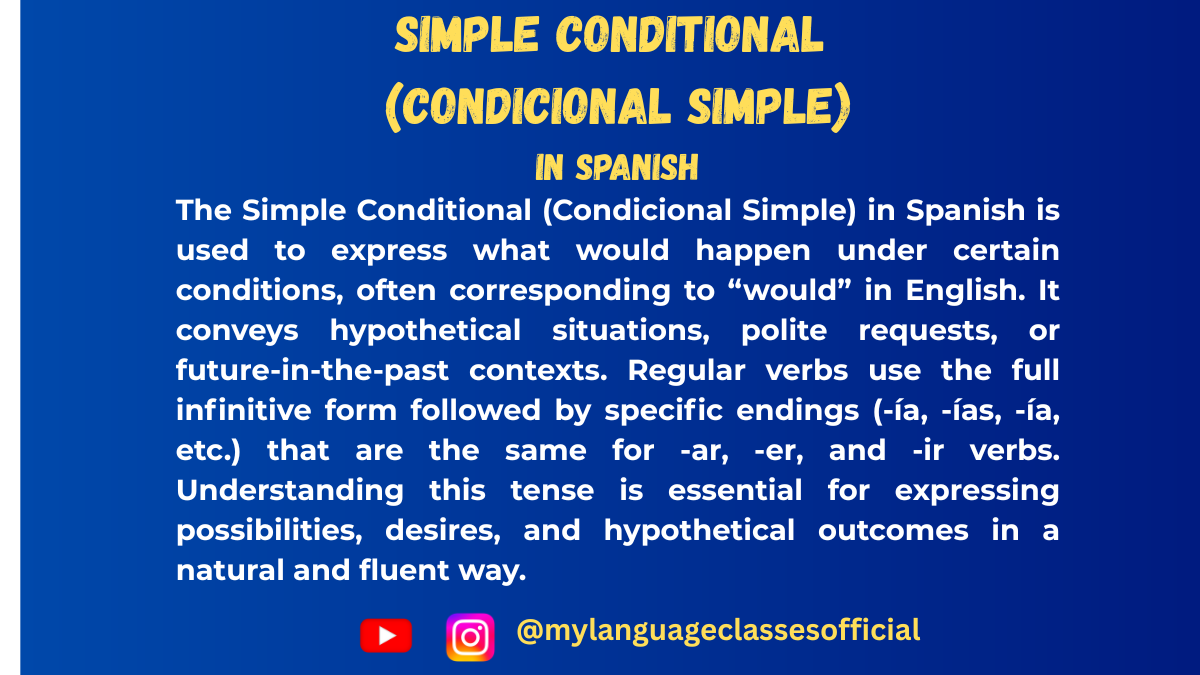
Simple Conditional (Condicional Simple) Tense/Mode in Spanish
The Simple Conditional tense, known as “Condicional Simple” in Spanish, is used to express actions that would happen under certain conditions. It is equivalent to the English “would” form of verbs. This tense is commonly used to express hypothetical situations, polite requests, desires, and conjectures about the past. Understanding the Simple Conditional is essential for fluency in Spanish as it appears frequently in everyday conversations and formal writing.
Common Expressions Using Simple Conditional
Here are some common expressions that use the Simple Conditional tense in Spanish along with their meanings:
- Me gustaría – I would like
- Podrías ayudarme? – Could you help me?
- Deberías estudiar más. – You should study more.
- Sería mejor si… – It would be better if…
- Me encantaría ir contigo. – I would love to go with you.
- Habría sido un buen día. – It would have been a good day.
- Tendrías tiempo para hablar? – Would you have time to talk?
- Querría saber más sobre esto. – I would like to know more about this.
- Si fuera posible, viajaría por todo el mundo. – If it were possible, I would travel around the world.
- No harías eso, ¿verdad? – You wouldn’t do that, right?
Things to Keep in Mind
- Articles and Gender: As with other tenses in Spanish, the gender and number of nouns remain unchanged in the conditional tense.
- Pronouns: Indirect and direct object pronouns are placed before the conjugated verb.
- Regular vs. Irregular Verbs: While most verbs follow a predictable conjugation pattern, there are several irregular verbs that require memorization.
- Plural Forms: The conditional tense applies to singular and plural subjects without changing the verb stem.
- Politeness: This tense is commonly used for polite requests and suggestions.
When to Use
The Simple Conditional is used in the following situations:
- Hypothetical Situations:
- Si tuviera más dinero, compraría un coche. (If I had more money, I would buy a car.)
- Polite Requests:
- Podrías cerrar la ventana, por favor? (Could you close the window, please?)
- Suggestions and Advice:
- Deberías dormir más. (You should sleep more.)
- Desires and Preferences:
- Me encantaría visitar España. (I would love to visit Spain.)
- Speculation about the Past:
- Sería alrededor de las 8 cuando llegó. (It must have been around 8 when he arrived.)
Conjugation of Regular Verbs
To form the Simple Conditional tense, take the infinitive verb and add the following endings for all three verb categories (-AR, -ER, -IR):
Subject Ending Yo -ía Tú -ías Él/Ella/Usted -ía Nosotros/as -íamos Vosotros/as -íais Ellos/Ellas/Ustedes -ían
Example of Regular Verb Conjugation:
- Hablar (to speak) → hablaría, hablarías, hablaría, hablaríamos, hablaríais, hablarían
- Comer (to eat) → comería, comerías, comería, comeríamos, comeríais, comerían
- Vivir (to live) → viviría, vivirías, viviría, viviríamos, viviríais, vivirían
Irregular Verbs and Their Conjugation
Some verbs have irregular stems in the Simple Conditional tense. Here are common irregular verbs:
Infinitive Stem Change Example (Yo form) Tener (to have) tendr- tendría Poder (to be able to) podr- podría Hacer (to do/make) har- haría Decir (to say) dir- diría Venir (to come) vendr- vendría Poner (to put) pondr- pondría Saber (to know) sabr- sabría Salir (to leave) saldr- saldría Querer (to want) querr- querría Haber (to have – auxiliary) habr- habría Example Sentences:
- Tendría más tiempo si terminara mi trabajo temprano. (I would have more time if I finished my work early.)
- Diría la verdad si me preguntaras. (I would tell the truth if you asked me.)
Regular Verbs in Simple Conditional
Verb Meaning Example 1 (Spanish) Meaning (English) Example 2 (Spanish) Meaning (English) Hablar To speak Hablaría con ella. I would speak with her. Hablaríamos sobre el tema. We would talk about the topic. Comer To eat Comeríamos en un restaurante. We would eat in a restaurant. Comería menos azúcar. I would eat less sugar. Vivir To live Viviríamos en España. We would live in Spain. Viviría en la playa. I would live at the beach. Trabajar To work Trabajaría más horas. I would work more hours. Trabajaríamos juntos. We would work together. Estudiar To study Estudiaría francés. I would study French. Estudiaríamos historia. We would study history. Viajar To travel Viajaría a México. I would travel to Mexico. Viajaríamos en verano. We would travel in summer. Escuchar To listen Escucharía música. I would listen to music. Escucharíamos el concierto. We would listen to the concert. Aprender To learn Aprendería a nadar. I would learn to swim. Aprenderíamos japonés. We would learn Japanese. Escribir To write Escribiría una carta. I would write a letter. Escribiríamos un libro. We would write a book. Comprar To buy Compraría un coche. I would buy a car. Compraríamos una casa. We would buy a house.
More Example Sentences
- Me encantaría viajar a Japón el próximo año. (I would love to travel to Japan next year.)
- Si tuvieras tiempo, iríamos al cine juntos. (If you had time, we would go to the movies together.)
- ¿Qué harías si fueras el presidente del país? (What would you do if you were the president of the country?)
- Juan dijo que llamaría más tarde. (Juan said he would call later.)
- En su lugar, yo no diría nada. (In his place, I wouldn’t say anything.)
- Mis abuelos vivirían en la playa si pudieran. (My grandparents would live at the beach if they could.)
- ¿Podrías ayudarme con esta tarea? (Could you help me with this homework?)
- Nosotros compraríamos una casa más grande si tuviéramos más dinero. (We would buy a bigger house if we had more money.)
- Ella nunca mentiría a sus amigos. (She would never lie to her friends.)
- Si hiciera sol, saldríamos a caminar. (If it were sunny, we would go for a walk.)
Fill in the Blanks:
- Si tuviera más dinero, ______ (comprar) un coche nuevo.
- ¿Qué ______ (hacer) tú si ganaras la lotería?
- Nosotros ______ (viajar) por todo el mundo si pudiéramos.
- Ella dijo que ______ (venir) a la fiesta, pero no pudo.
- En tu lugar, yo no ______ (decir) nada sobre el asunto.
- Mis padres me prometieron que me ______ (dar) un regalo especial para mi cumpleaños.
- Si fueras famoso, ¿con quién ______ (trabajar)?
- Ustedes ______ (poder) aprender español más rápido si practicaran todos los días.
- Juan ______ (querer) aprender otro idioma, pero no tiene tiempo.
- Si hiciera buen tiempo, nosotros ______ (salir) a pasear.
Answers
- compraría
- harías
- viajaríamos
- vendría
- diría
- darían
- trabajarías
- podrían
- querría
- saldríamos
Conclusion
Mastering the Simple Conditional tense in Spanish is crucial for expressing hypothetical situations, politeness, and speculations. By understanding its conjugations, irregular forms, and common expressions, you can enhance your fluency and confidence in Spanish conversations.
If you enjoyed this lesson, be sure to check out more posts like this on my blog at My Language Classes. Don’t forget to subscribe my YouTube channel and follow me on Instagram for the latest language learning tips and lessons. Leave a comment below to share your thoughts, or ask any questions you have about nouns.
Happy learning! 😊
- 100 Spanish Example Sentences
- 100 Spanish Fill-in-the-Blanks Exercises
- 100 Spanish Vocabulary Lists
- Spanish – Advanced
- Spanish – Beginner
- Spanish – Intermediate
-
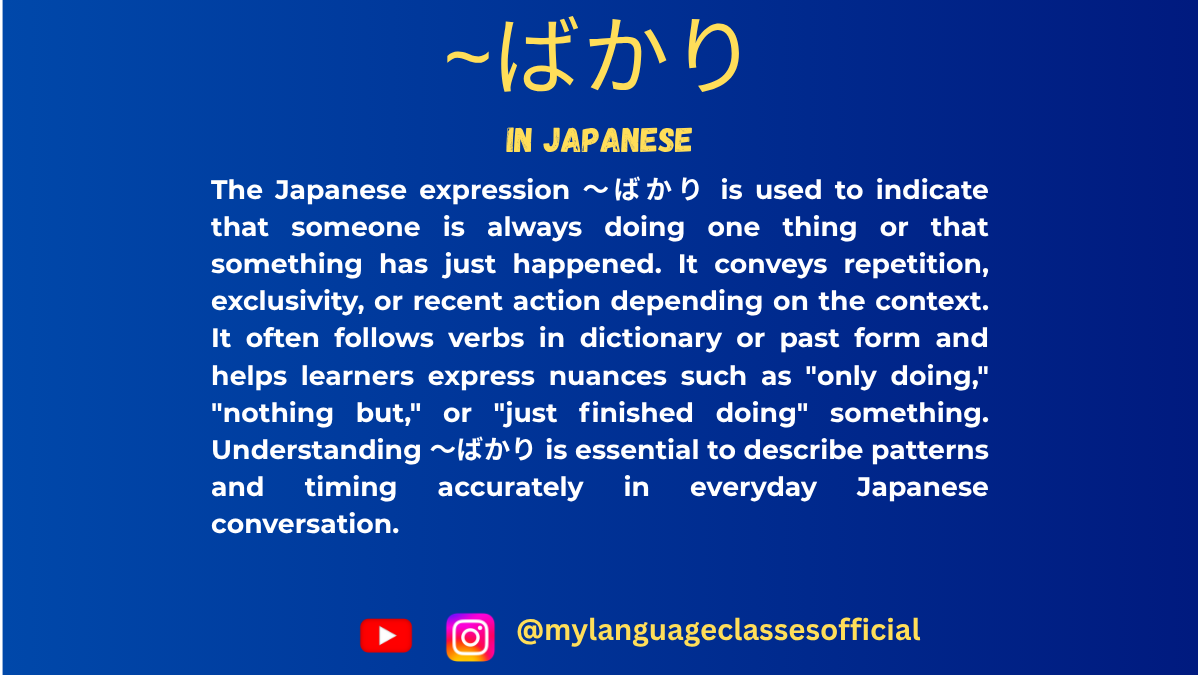
Understanding ~ばかり in Japanese | My Language Classes
Understanding ~ばかり in Japanese
The Japanese grammar pattern ~ばかり (bakari) is often used to express the idea of “only,” “just,” or “nothing but.” It can indicate an excess of something, recent completion, or restriction to a particular action or state. The meaning changes based on the context, making it a versatile and essential grammar structure in Japanese.
This blog will explore the formation, various uses, and nuances of ~ばかり in different situations, along with a list of verbs, nouns, and adjectives in the ~ばかり form with example sentences.
Formation of ~ばかり
~ばかり can be formed using verbs, nouns, and adjectives. Below is the formation process:
1. Verb + ばかり
- Vた形 (Past Tense) + ばかり → Indicates something just happened.
- Example: 食べたばかり (tabeta bakari) → “Just ate.”
2. Noun + ばかり
- Noun + ばかり → Indicates “only” or “nothing but.”
- Example: お菓子ばかり (okashi bakari) → “Nothing but sweets.”
3. Adjective + ばかり
- い-adjective (Base Form) + ばかり → Indicates an excess.
- Example: 暑いばかり (atsui bakari) → “Nothing but hot.”
- な-adjective + ばかり → Similar excessive meaning.
- Example: 退屈ばかり (taikutsu bakari) → “Only boredom.”
Usage of ~ばかり in Different Situations
- Indicating Recent Completion
- Formation: Verb (Past Tense) + ばかり
- Example: 宿題を終えたばかりです。
- (Shukudai o oeta bakari desu.) → “I just finished my homework.”
- Indicating Excessive Amount or Focus
- Formation: Noun + ばかり
- Example: 甘いものばかり食べる。
- (Amai mono bakari taberu.) → “I eat only sweet things.”
- Expressing “Nothing but” or “Only”
- Formation: Noun/Adjective + ばかり
- Example: 暑いばかりで、外に出たくない。
- (Atsui bakari de, soto ni detakunai.) → “It’s just too hot, so I don’t want to go outside.”
Situations Where ~ばかり is Used
- Describing Recent Actions (〜たばかり)
- Emphasizing Quantity
- Expressing Excessive Conditions
- Showing a Restriction (Nothing but X)
- Expressing Repetition of an Action
List of Verbs, Nouns, and Adjectives in ~ばかり Form
Type Base Form ~ばかり Form Example Sentence 1 Romaji Meaning Example Sentence 2 Romaji Meaning Verb 食べる 食べたばかり ご飯を食べたばかりです。 Gohan o tabeta bakari desu. I just ate a meal. 朝ごはんを食べたばかりです。 Asagohan o tabeta bakari desu. I just had breakfast. Verb 行く 行ったばかり 学校へ行ったばかりです。 Gakkou e itta bakari desu. I just went to school. 病院へ行ったばかりです。 Byouin e itta bakari desu. I just went to the hospital. Verb 帰る 帰ったばかり 家に帰ったばかりです。 Ie ni kaetta bakari desu. I just came home. 会社から帰ったばかりです。 Kaisha kara kaetta bakari desu. I just returned from work. Verb 見る 見たばかり 映画を見たばかりです。 Eiga o mita bakari desu. I just watched a movie. 彼はテレビを見たばかりです。 Kare wa terebi o mita bakari desu. He just watched TV. Verb 買う 買ったばかり 新しい靴を買ったばかりです。 Atarashii kutsu o katta bakari desu. I just bought new shoes. 本を買ったばかりです。 Hon o katta bakari desu. I just bought a book. Noun 野菜 野菜ばかり 野菜ばかり食べています。 Yasai bakari tabete imasu. I eat only vegetables. 彼は野菜ばかり食べる。 Kare wa yasai bakari taberu. He eats nothing but vegetables. Noun 宿題 宿題ばかり 宿題ばかりしている。 Shukudai bakari shite iru. I’m always doing homework. 彼は宿題ばかりしています。 Kare wa shukudai bakari shite imasu. He does nothing but homework. Adjective 高い 高いばかり この店の商品は高いばかりです。 Kono mise no shouhin wa takai bakari desu. The products in this store are just expensive. この時計は高いばかりで機能が少ない。 Kono tokei wa takai bakari de kinou ga sukunai. This watch is just expensive with few functions.
More Example Sentences
- 日本に来たばかりなので、日本語がわかりません。
Nihon ni kita bakari na no de, nihongo ga wakarimasen.
“I just came to Japan, so I don’t understand Japanese.” - 彼はゲームばかりしています。
Kare wa geemu bakari shite imasu.
“He does nothing but play games.” - 母は料理ばかり作っています。
Haha wa ryouri bakari tsukutte imasu.
“My mother is always cooking.” - この映画は泣くばかりの話だった。
Kono eiga wa naku bakari no hanashi datta.
“This movie was nothing but a tearjerker.” - 彼女は文句ばかり言っている。
Kanojo wa monku bakari itte iru.
“She does nothing but complain.” - 父は仕事ばかりしています。
Chichi wa shigoto bakari shite imasu.
“My father is always working.” - 彼はスマホばかり見ている。
Kare wa sumaho bakari mite iru.
“He does nothing but look at his smartphone.” - 昨日買った靴が汚れたばかりです。
Kinou katta kutsu ga yogoreta bakari desu.
“The shoes I bought yesterday just got dirty.” - 子供たちは遊んでばかりいる。
Kodomo-tachi wa asonde bakari iru.
“The kids are always playing.” - この部屋は暗いばかりで、気分が悪くなる。
Kono heya wa kurai bakari de, kibun ga waruku naru.
“This room is nothing but dark, making me feel unwell.”
Fill in the Blanks
- 昨日、日本に(______)ばかりなので、まだ時差ぼけがあります。
- お母さんは朝からずっと(______)ばかり作っている。
- 彼はテレビを(______)ばかりいるので、全然運動しない。
- さっきご飯を(______)ばかりだから、お腹がいっぱいだ。
- 友達は(______)ばかり言って、全然手伝ってくれない。
- 旅行から(______)ばかりで、荷物を片付けていない。
- 彼はお金のこと(______)ばかり考えている。
- この町は高いビル(______)ばかりで、昔の雰囲気がなくなった。
- 夏になると、暑い(______)ばかりで外に出るのが嫌になる。
- 赤ちゃんが生まれたばかりなので、(______)ばかりいる。
Answers
- 来た (kita) → 昨日、日本に来たばかりなので、まだ時差ぼけがあります。
I just came to Japan yesterday, so I still have jet lag. - 料理 (ryouri) → お母さんは朝からずっと料理ばかり作っている。
My mother has been cooking nothing but food since morning. - 見て (mite) → 彼はテレビを見てばかりいるので、全然運動しない。
He does nothing but watch TV, so he never exercises. - 食べた (tabeta) → さっきご飯を食べたばかりだから、お腹がいっぱいだ。
I just ate a meal, so I’m full. - 文句 (monku) → 友達は文句ばかり言って、全然手伝ってくれない。
My friend does nothing but complain and never helps. - 帰った (kaetta) → 旅行から帰ったばかりで、荷物を片付けていない。
I just returned from a trip, so I haven’t unpacked yet. - お金 (okane) → 彼はお金ばかり考えている。
He only thinks about money. - ばかり (bakari) → この町は高いビルばかりで、昔の雰囲気がなくなった。
This town has nothing but tall buildings, and its old atmosphere is gone. - ばかり (bakari) → 夏になると、暑いばかりで外に出るのが嫌になる。
In summer, it’s nothing but hot, so I don’t want to go outside. - 泣いて (naite) → 赤ちゃんが生まれたばかりなので、泣いてばかりいる。
Since the baby was just born, they do nothing but cry.
Conclusion
The ~ばかり form is an essential grammar structure in Japanese that expresses recent completion, restriction, or excessiveness. By mastering its formation and usage, you can enhance your fluency and express various nuances in Japanese. Practice with the examples provided and incorporate them into your daily conversations!
That’s it! Keep practicing, and soon you’ll be using ~ばかり like a native speaker.
If you enjoyed this lesson, be sure to check out more posts like this on my blog at My Language Classes. Don’t forget to subscribe my YouTube channel and follow me on Instagram for the latest language learning tips and lessons. Leave a comment below to share your thoughts, or ask any questions you have about nouns.
Happy learning! 😊
- Vた形 (Past Tense) + ばかり → Indicates something just happened.
-
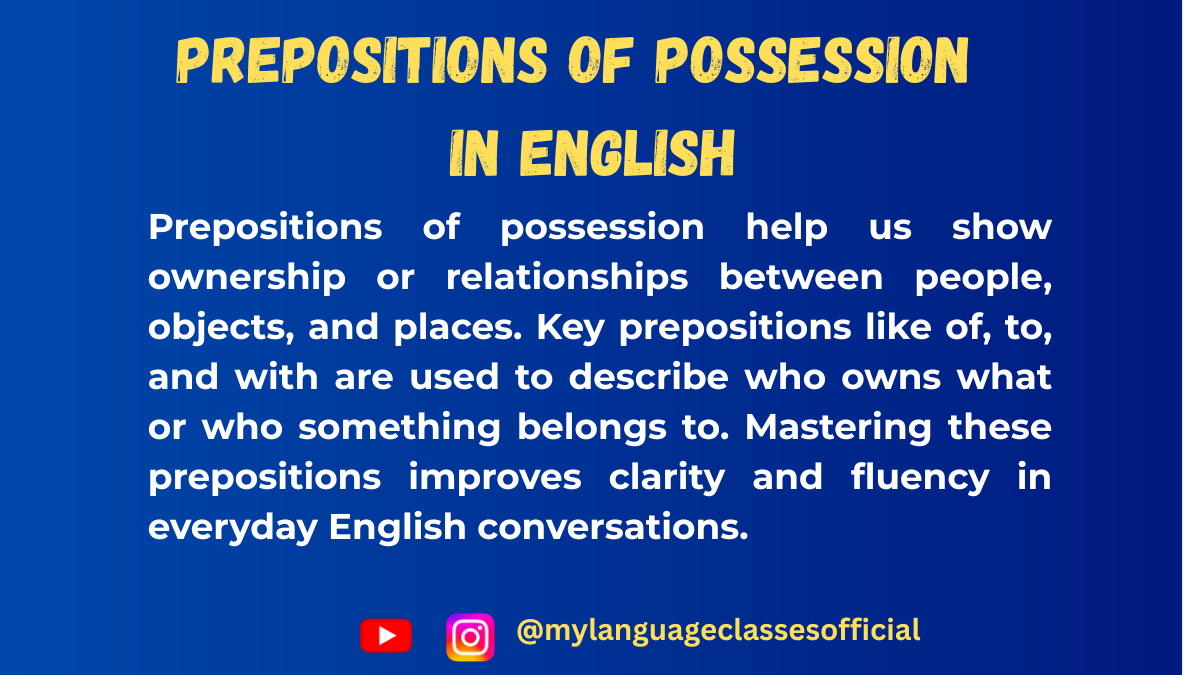
Prepositions of Possession in English
Prepositions of possession are words that indicate ownership, relationship, or belonging. They show how something or someone is related to another person or thing. In this blog post, we will discuss prepositions of possession in detail, their different usages, and provide numerous examples to help you master their application.
List of Prepositions of Possession
Below is a list of prepositions of possession along with their meanings and example sentences:
Preposition Meaning Example Sentence 1 Example Sentence 2 Of Indicates belonging or relation The pages of the book are torn. She is a friend of mine. To Shows possession, especially relationships This pen belongs to me. The key to the door is lost. With Indicates possession through an attribute or characteristic The boy with blue eyes is my cousin. She is the one with the golden necklace. By Can show authorship or ownership This novel is written by J.K. Rowling. The house by the river is beautiful. From Sometimes used to show possession or origin This advice came from my father. The letter from John is on the table. In Can indicate possession in certain contexts The error in the report must be corrected. There is wisdom in his words. For Can imply possession or association This gift is for my mother. The medal for bravery was awarded to him. About Sometimes used to indicate possession or relation The book about Shakespeare is very informative. There is a rumor about the new manager.
Situations Where Prepositions of Possession Are Used
- Indicating Ownership:
- Example: The cover of the book is blue.
- Describing Relationships:
- Example: He is a friend of mine.
- Attributing Characteristics:
- Example: The girl with curly hair is my sister.
- Denoting Authorship:
- Example: The poem by Robert Frost is inspiring.
- Showing Source or Origin:
- Example: The idea from our teacher was brilliant.
- Expressing Purpose or Benefit:
- Example: The scholarship for international students is available.
- Connecting Items with a Relationship:
- Example: The door to the basement is locked.
- Discussing Characteristics:
- Example: The car with tinted windows looks stylish.
- Using Articles with Prepositions of Possession:
- Example: A book of knowledge is valuable.
- Considering Gender in Possession:
- Example: The daughter of the king is the princess.
More Example Sentences
- The rules of the game are easy to understand.
- The key to my house is missing.
- She is the woman with the red umbrella.
- The novel by Charles Dickens is a classic.
- The letter from my mother made me emotional.
- The decision in the meeting was unanimous.
- The gift for my sister arrived today.
- There is a rumor about the new project.
- The map of the city is detailed.
- The teacher with a kind heart always helps students.
Fill in the Blanks
- The color ___ the car is red.
- The necklace ___ diamonds is expensive.
- The painting ___ Leonardo da Vinci is famous.
- This letter is ___ my best friend.
- The answer ___ the question is correct.
- The story ___ Harry Potter is interesting.
- The dog ___ the brown spots is friendly.
- The scholarship ___ outstanding students is competitive.
- The door ___ the balcony is open.
- The sound ___ the guitar is soothing.
Answers
- of
- with
- by
- from
- to
- about
- with
- for
- to
- of
Things to Keep in Mind
- Context Matters: The same preposition can have different meanings in different sentences.
- Articles (a, an, the): These should be used correctly with prepositions of possession.
- Gender Awareness: When referring to possession related to people, gender-specific words like his, her, or their may be necessary.
- Fixed Expressions: Some prepositions of possession appear in fixed expressions, like a friend of mine.
- Word Order: Ensure proper sentence structure when using prepositions of possession.
Conclusion
Mastering prepositions of possession is essential for fluency in English. They help establish relationships between people, objects, and ideas. By understanding their different uses and practicing with examples, you can use them naturally in conversations and writing. Keep practicing, and soon, using prepositions of possession will become second nature!
If you enjoyed this lesson, be sure to check out more posts like this on my blog at My Language Classes. Don’t forget to subscribe my YouTube channel and follow me on Instagram for the latest language learning tips and lessons. Leave a comment below to share your thoughts, or ask any questions you have about nouns.
Happy learning! 😊
- Indicating Ownership:
-
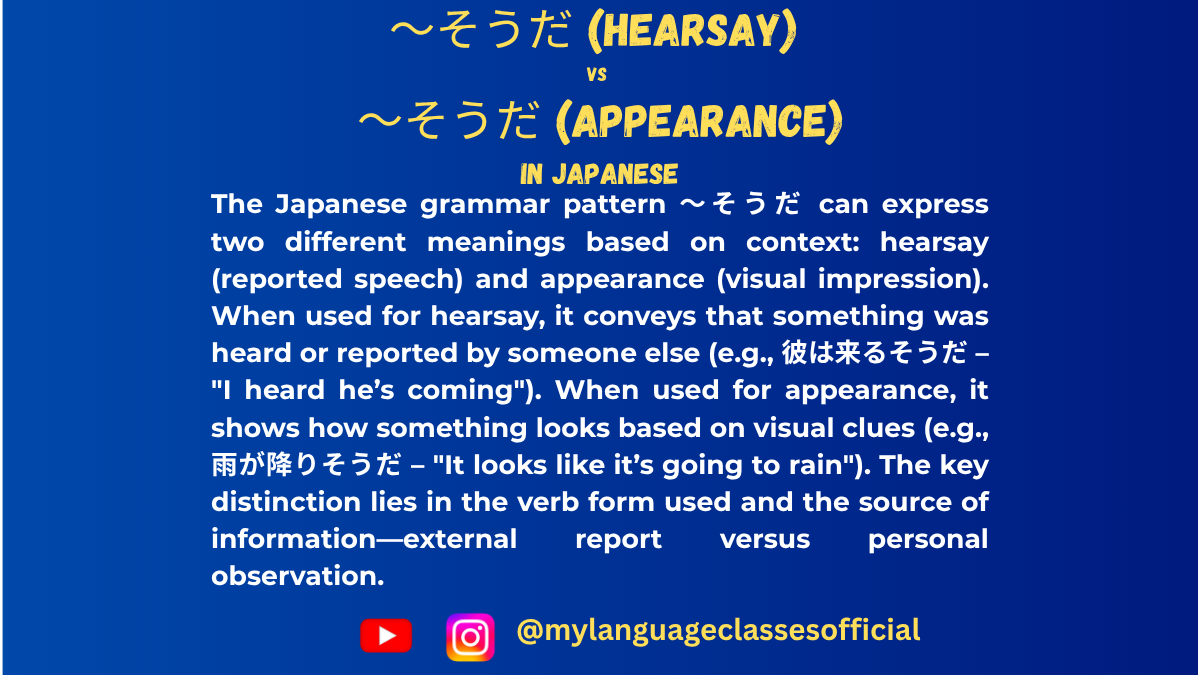
〜そうだ: Hearsay vs Appearance | My Language Classes
〜そうだ (Hearsay) vs (Appearance): Understanding the Difference
In Japanese, the grammatical pattern 〜そうだ is used in two different ways: Hearsay (伝聞: denbun) and Appearance (様子: yousu).
- Hearsay (〜そうだ) conveys reported speech or second-hand information, meaning that the speaker is relaying information they have heard from another source.
- Appearance (〜そうだ) expresses how something looks based on visual or sensory perception.
Despite their identical forms, these two patterns function differently and follow distinct grammatical structures. Let’s break them down.
Formation
Formation of 〜そうだ (Hearsay)
This form is used to report information obtained from another source.
- Verbs (Dictionary Form) + そうだ
- 例: 彼は日本へ行くそうだ。(Kare wa Nihon e iku sou da.)
“I heard that he is going to Japan.”
- 例: 彼は日本へ行くそうだ。(Kare wa Nihon e iku sou da.)
- い-adjectives (Plain Form) + そうだ
- 例: この映画は面白いそうだ。(Kono eiga wa omoshiroi sou da.)
“I heard this movie is interesting.”
- 例: この映画は面白いそうだ。(Kono eiga wa omoshiroi sou da.)
- な-adjectives (だ → だそうだ)
- 例: 彼は元気だそうだ。(Kare wa genki da sou da.)
“I heard he is energetic.”
- 例: 彼は元気だそうだ。(Kare wa genki da sou da.)
- Nouns (だ → だそうだ)
- 例: 彼は先生だそうだ。(Kare wa sensei da sou da.)
“I heard he is a teacher.”
- 例: 彼は先生だそうだ。(Kare wa sensei da sou da.)
Formation of 〜そうだ (Appearance)
This form is used to express the appearance of something.
- Verb (Stem) + そうだ
- 例: 雨が降りそうだ。(Ame ga furisou da.)
“It looks like it will rain.”
- 例: 雨が降りそうだ。(Ame ga furisou da.)
- い-adjectives (Drop い, add そうだ)
- 例: このケーキは美味しそうだ。(Kono keeki wa oishisou da.)
“This cake looks delicious.”
- 例: このケーキは美味しそうだ。(Kono keeki wa oishisou da.)
- な-adjectives + そうだ
- 例: 彼は元気そうだ。(Kare wa genki sou da.)
“He looks energetic.”
- 例: 彼は元気そうだ。(Kare wa genki sou da.)
Usage
Usage of 〜そうだ (Hearsay)
- Used when reporting something heard from another source.
- Cannot be used for personal opinions or firsthand information.
- Often used in news reports, gossip, or relaying messages.
Usage of 〜そうだ (Appearance)
- Used when making judgments based on appearance.
- Cannot be used when the speaker has factual information.
- Commonly used for food, weather, people’s emotions, or impending actions.
Things to Keep in Mind
- Context is important: The meaning of 〜そうだ changes depending on the sentence.
- Be careful with negation:
- For hearsay, use 〜そうではない.
- For appearance, use 〜そうにない.
Example Sentences
Usage of 〜そうだ (Hearsay)
- 天気予報によると、明日は雨が降るそうだ。
(Tenki yohou ni yoru to, ashita wa ame ga furu sou da.)
“According to the weather forecast, it will rain tomorrow.” - 田中さんは結婚するそうだ。
(Tanaka-san wa kekkon suru sou da.)
“I heard that Tanaka-san is getting married.” - 先生によると、来週テストがあるそうだ。
(Sensei ni yoru to, raishuu tesuto ga aru sou da.)
“According to the teacher, there will be a test next week.” - 彼は昨日病気だったそうだ。
(Kare wa kinou byouki datta sou da.)
“I heard he was sick yesterday.” - ニュースで、新しいレストランがオープンするそうだ。
(Nyuusu de, atarashii resutoran ga oopun suru sou da.)
“I heard from the news that a new restaurant is opening.” - 友達によると、彼はフランスに引っ越すそうだ。
(Tomodachi ni yoru to, kare wa Furansu ni hikkosu sou da.)
“According to my friend, he is moving to France.” - 彼は有名な作家だそうだ。
(Kare wa yuumei na sakka da sou da.)
“I heard he is a famous writer.” - 彼女は明日来るそうだ。
(Kanojo wa ashita kuru sou da.)
“I heard she is coming tomorrow.” - 彼は泳げないそうだ。
(Kare wa oyogenai sou da.)
“I heard he can’t swim.” - 彼は英語が得意だそうだ。
(Kare wa eigo ga tokui da sou da.)
“I heard he is good at English.”
Usage of 〜そうだ (Appearance)
- 彼は疲れていそうだ。 (Kare wa tsukareteisou da.)
“He looks tired.” - このスープは熱そうだ。 (Kono suupu wa atsusou da.)
“This soup looks hot.” - 彼女は悲しそうだ。 (Kanojo wa kanashisou da.)
“She looks sad.” - 空が暗くて、すぐに雨が降りそうだ。 (Sora ga kurakute, sugu ni ame ga furisou da.)
“The sky is dark, and it looks like it’s going to rain soon.” - そのケーキは美味しそうだ。 (Sono keeki wa oishisou da.)
“That cake looks delicious.” - 彼は怒っていそうだ。 (Kare wa okotteisou da.)
“He looks angry.” - この本は難しそうだ。 (Kono hon wa muzukashisou da.)
“This book looks difficult.” - あの犬は優しそうだ。 (Ano inu wa yasashisou da.)
“That dog looks gentle.” - 彼女は幸せそうだ。 (Kanojo wa shiawasesou da.)
“She looks happy.” - このコートは暖かそうだ。 (Kono kooto wa atatakakusou da.)
“This coat looks warm.”
Fill in the Blanks
Fill in the blanks with the appropriate form of 〜そうだ (Hearsay) or 〜そうだ (Appearance).
- 天気予報によると、明日は雪が____。
(According to the weather forecast, it will snow tomorrow.) - そのスープはとても熱____から、気をつけてね。
(That soup looks very hot, so be careful.) - 彼女は新しい仕事がとても楽しい____よ。
(I heard that she really enjoys her new job.) - 彼はお腹が空いてい____。
(He looks hungry.) - 先生によると、来週の試験は難しい____。
(According to the teacher, next week’s test will be difficult.) - 彼女は昨日熱があった____。
(I heard she had a fever yesterday.) - その映画はとても面白い____よ。
(I heard that the movie is very interesting.) - 彼は今にも泣き____。
(He looks like he’s about to cry.) - 空が暗いから、雨が降り____ね。
(The sky is dark, so it looks like it’s going to rain.) - 友達によると、彼はスペイン語が話せる____。
(According to my friend, he can speak Spanish.)
Answers
- 降るそうだ
- そうだ
- そうだ
- そうだ
- そうだ
- そうだ
- そうだ
- そうだ
- そうだ
- そうだ
Conclusion
Understanding the difference between 〜そうだ (Hearsay) and 〜そうだ (Appearance) is crucial for proper Japanese communication. By distinguishing between reported speech and perceived appearance, learners can use these patterns naturally in conversations. Keep practicing, and soon, you’ll be using 〜そうだ like a native speaker!
If you enjoyed this lesson, be sure to check out more posts like this on my blog at My Language Classes. Don’t forget to subscribe my YouTube channel and follow me on Instagram for the latest language learning tips and lessons. Leave a comment below to share your thoughts, or ask any questions you have about nouns.
Happy learning! 😊
-

From Struggle to Joy: How I Learned a Language | My Language Classes
How I Stopped Struggling and Started Enjoying Learning a New Language
A few years ago, I decided to learn Spanish. At first, it was exciting—I downloaded all the apps, made flashcards, and watched YouTube videos. But after a few months, I hit a wall. I could understand some words, but forming sentences felt impossible. I’d freeze up when trying to speak, afraid of making mistakes. It was frustrating, and I almost gave up.
Then, something changed. I realized I was approaching language learning the wrong way. Instead of treating it like a school subject, I started making it a natural part of my life.
Here’s what helped me:
I stopped aiming for perfection. I accepted that mistakes are part of the process. Kids don’t learn languages by studying grammar first—they learn by trying, failing, and trying again.
I found content I genuinely enjoyed. I started watching Spanish TV shows with subtitles, listening to music, and even following Spanish-speaking influencers. Learning became fun instead of a chore.
I practiced speaking early, even if I felt silly. I talked to myself, narrated my daily routine, and joined online language exchanges. My Spanish wasn’t great at first, but I slowly got better just by using it.
I focused on phrases, not just words. Instead of memorizing random vocabulary, I learned useful sentences and expressions that I could actually use in conversations.
I made it part of my daily routine. Even if it was just 10 minutes a day, consistency made a huge difference. Little by little, it all added up.
Now, I’m not fluent (yet!), but I can hold conversations, express myself, and—most importantly—I enjoy the process.
If you’re struggling to learn a language, don’t be too hard on yourself. Keep going, have fun with it, and remember: you don’t have to be perfect to communicate. Just start speaking, and the rest will follow.
What’s been your biggest challenge in learning a new language ?
If you enjoyed this blog, be sure to check out more posts like this on my blog at My Language Classes. Don’t forget to subscribe my YouTube channel and follow me on Instagram for the latest language learning tips and lessons. Leave a comment below to share your thoughts, or ask any questions you have about nouns.
Happy learning! 😊
-
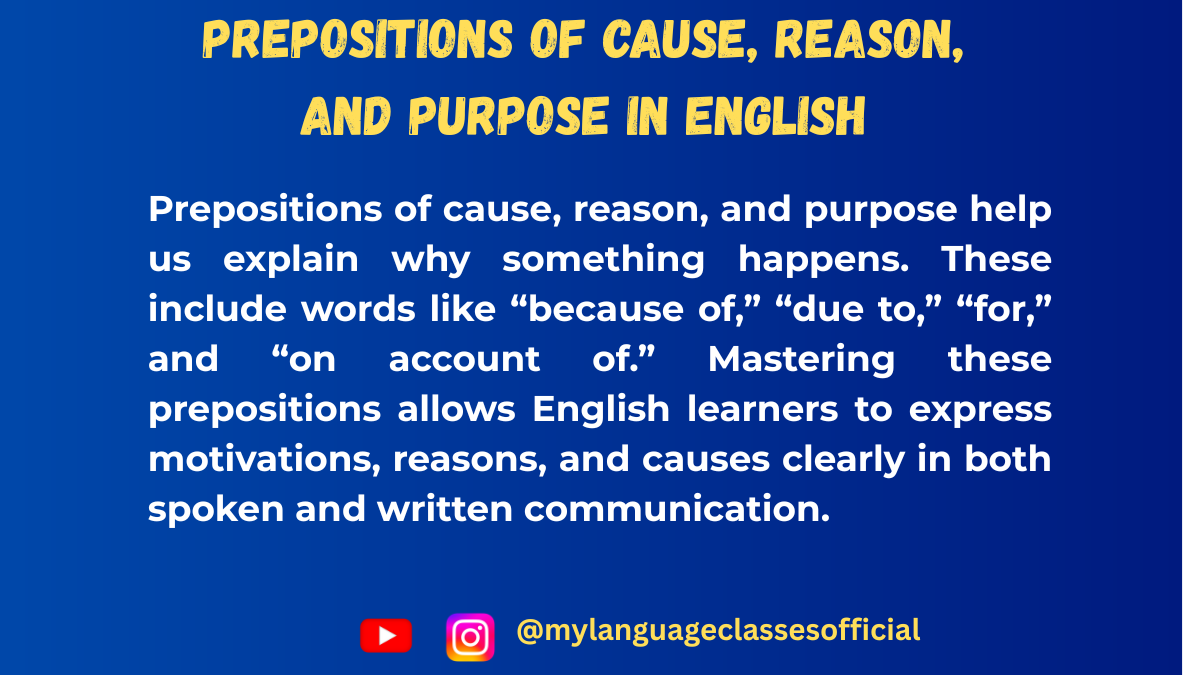
Prepositions of Cause, Reason, and Purpose in English
Introduction
Prepositions play a crucial role in English grammar as they help establish relationships between different elements in a sentence. Among them, prepositions of cause, reason, and purpose clarify why something happens, the reason behind an event, or the intention behind an action. Understanding their usage correctly enhances fluency and accuracy in writing and speaking.
Usage of Prepositions of Cause, Reason, and Purpose
1. Prepositions of Cause
Prepositions of cause explain why something happens. They indicate the factor that caused a particular outcome.
Common Prepositions of Cause:
- Because of
- Due to
- On account of
- Owing to
Examples:
- The match was postponed because of the heavy rain.
- She failed the test due to a lack of preparation.
2. Prepositions of Reason
Prepositions of reason indicate the reason behind an action. They explain why a particular situation exists.
Common Prepositions of Reason:
- For
- From
- Out of
Examples:
- He was praised for his honesty.
- She started crying out of frustration.
3. Prepositions of Purpose
Prepositions of purpose express the goal or aim of an action.
Common Prepositions of Purpose:
- For
- To
- With a view to
Examples:
- She studies hard for a better future.
- He left early to catch the train.
Situations Where Prepositions of Cause, Reason, and Purpose Are Used
- Explaining consequences (e.g., “The flight was delayed because of bad weather.”)
- Stating reasons behind actions (e.g., “She apologized for her mistake.”)
- Indicating an emotional or physical reaction (e.g., “He shivered from cold.”)
- Expressing motivations and intentions (e.g., “He works hard for success.”)
- Providing justifications (e.g., “She was fined on account of reckless driving.”)
List of Prepositions of Cause, Reason, and Purpose with Example Sentences
Preposition Type Example Sentence 1 Example Sentence 2 Because of Cause The flight was canceled because of fog. He missed school because of illness. Due to Cause The event was postponed due to rain. The project failed due to mismanagement. On account of Cause The road was closed on account of construction. She resigned on account of personal reasons. Owing to Cause The traffic was heavy owing to an accident. The delay was owing to technical issues. For Reason He received an award for bravery. She was admired for her kindness. From Reason He suffered from a severe headache. She is recovering from an injury. Out of Reason She spoke out of anger. He donated money out of generosity. To Purpose He went to the store to buy groceries. She practices daily to improve her skills. For Purpose He exercises for good health. She took a course for career growth. With a view to Purpose She is saving money with a view to buying a house. He trained hard with a view to winning the championship.
More Example Sentences
- She couldn’t attend the meeting because of an emergency.
- The project was unsuccessful due to insufficient funding.
- They were punished for breaking the rules.
- He retired early on account of health issues.
- She screamed out of fear.
- The campaign was launched with a view to raising awareness.
- He is respected for his contributions to science.
- The doctor prescribed medicine for flu symptoms.
- She skipped lunch owing to her busy schedule.
- He studied abroad to gain international exposure.
Fill in the Blanks
- The match was canceled ___ heavy rain.
- He was awarded a medal ___ his bravery.
- She left early ___ pick up her kids.
- The school was closed ___ bad weather.
- He donated money ___ kindness.
- She was fined ___ reckless driving.
- He started crying ___ frustration.
- She took this job ___ a better future.
- He trained hard ___ winning the championship.
- The company shut down ___ financial losses.
Answers:
- Because of
- For
- To
- Due to
- Out of
- On account of
- Out of
- For
- With a view to
- Owing to
Things to Keep in Mind
- “Because of” vs. “Due to”: “Due to” is often followed by a noun, while “because of” is more flexible.
- “For” can indicate both reason and purpose, so its meaning depends on context.
- “Owing to” and “on account of” are formal and commonly used in written English.
- “To” always indicates purpose, while “from” often signifies the origin of a reason.
- Double-check preposition usage in formal writing, as incorrect usage can alter meaning.
Conclusion
Mastering prepositions of cause, reason, and purpose is essential for effective communication. These prepositions help clarify why actions happen and the intent behind them. By understanding their nuances and practicing their use, learners can improve their fluency and accuracy in English. Keep practicing with different examples to develop confidence in using these prepositions correctly!
If you enjoyed this lesson, be sure to check out more posts like this on my blog at My Language Classes. Don’t forget to subscribe my YouTube channel and follow me on Instagram for the latest language learning tips and lessons. Leave a comment below to share your thoughts, or ask any questions you have about nouns.
Happy learning! 😊
-
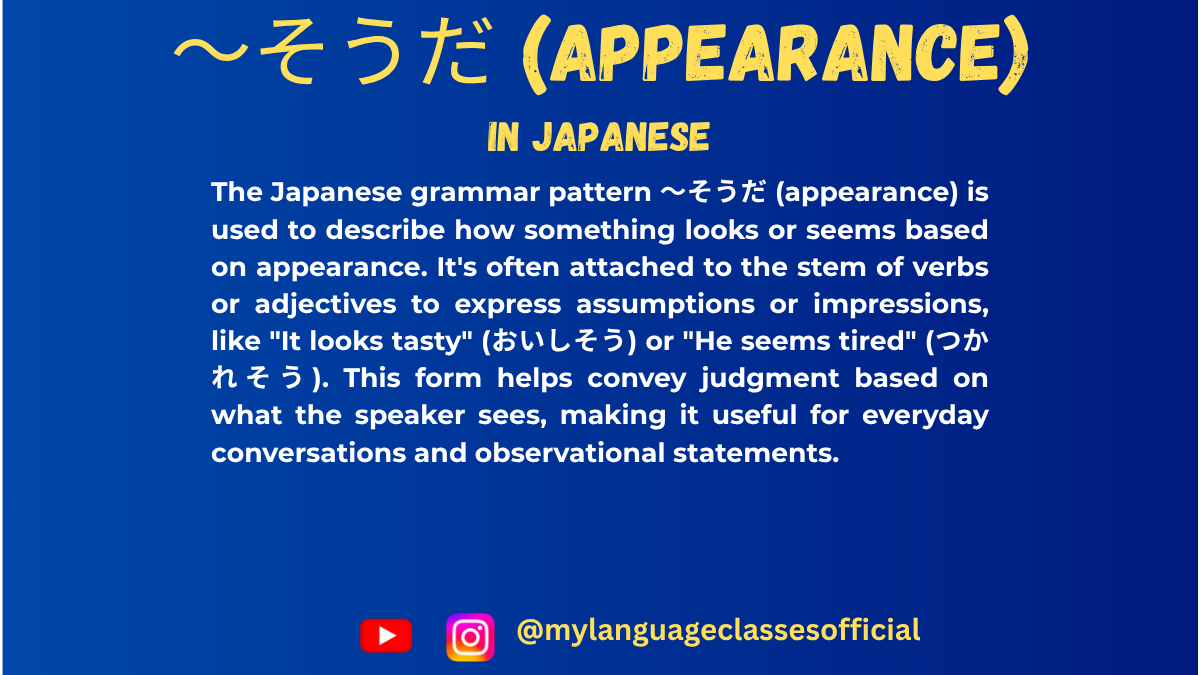
Using〜そうだ (Appearance) | My Language Classes:
Expressing ‘Looks Like’ in Japanese 〜そうだ
In Japanese, the grammar pattern 〜そうだ (sou da) is used to express that something “looks like” or “seems” a certain way based on its appearance. This pattern is useful when describing objects, actions, or situations that give a certain impression. It is often used with adjectives, nouns, and verbs, but its meaning slightly changes depending on the word category.
This blog will guide you through the formation, usage, and different contexts where 〜そうだ (Appearance) can be applied.
Formation of 〜そうだ (Appearance)
1. Using with Adjectives
- For i-adjectives: Drop the final い (i) and add 〜そうだ.
- Example: おいしい → おいしそうだ (Oishii → Oishisou da) – “Looks delicious.”
- For na-adjectives: Just add 〜そうだ directly to the adjective.
- Example: 美しい → 美しそうだ (Utsukushii → Utsukushisou da) – “Looks beautiful.”
2. Using with Verbs
- For verbs (stem form): Take the ます-stem and add 〜そうだ.
- Example: 雨が降る (Ame ga furu) → 雨が降りそうだ (Ame ga furisou da) – “It looks like it will rain.”
3. Using with Nouns
- Nouns do not usually take the 〜そうだ form when expressing appearance. Instead, のようだ or みたいだ is commonly used.
Usage of 〜そうだ (Appearance) Form
1. Describing Physical Appearance:
「他は強そうだ」
- Romaji: Kare wa tsuyosou da.
- English: He looks strong.
「このかばんは重そうだ」
- Romaji: Kono kaban wa omosou da.
- English: This bag looks heavy.
2. Expressing Predictions Based on Appearance:
「このケーキは生でたべられそうだ」
- Romaji: Kono kēki wa nama de taberare-sou da.
- English: This cake looks edible raw.
「この車はまだ動きそうだ」
- Romaji: Kono kuruma wa mada ugoki-sou da.
- English: This car looks like it can still run.
3. Talking About Immediate Future Actions:
「雨が降りそうだ」
- Romaji: Ame ga furi-sou da.
- English: It looks like it’s going to rain.
「電車が出発しそうだ」
- Romaji: Densha ga shuppatsu shisou da.
- English: The train looks like it’s about to depart.
Common Words with 〜そうだ (Appearance) Form:
Here’s a well-structured table with verbs, nouns, and adjectives in their 〜そうだ (Appearance) Form, along with two example sentences for each.
Type Word 〜そうだ Form Example Sentence 1 Romaji English Meaning Example Sentence 2 Romaji English Meaning Verb 食べる (taberu) – to eat 食べられそうだ (taberare-sou da) このケーキは美味しそうだから食べられそうだ。 Kono kēki wa oishisou dakara taberare-sou da. This cake looks delicious, so it seems edible. このスープは熱そうだけど飲めそうだ。 Kono sūpu wa atsusou dakedo nome-sou da. This soup looks hot, but it seems drinkable. Verb 壊れる (kowareru) – to break 壊れそうだ (koware-sou da) この椅子は古くて壊れそうだ。 Kono isu wa furukute koware-sou da. This chair looks old and about to break. このおもちゃは落としたら壊れそうだ。 Kono omocha wa otoshitara koware-sou da. This toy looks like it will break if dropped. Noun 雨 (ame) – rain 雨が降りそうだ (ame ga furi-sou da) 空が暗くなってきたから、雨が降りそうだ。 Sora ga kuraku natte kita kara, ame ga furi-sou da. The sky is getting dark, so it looks like it’s going to rain. 風が強くなってきたし、雨が降りそうだね。 Kaze ga tsuyoku natte kita shi, ame ga furi-sou da ne. The wind is getting stronger, and it looks like it will rain. Noun 試験 (shiken) – exam 試験が難しそうだ (shiken ga muzukashisou da) 明日の試験は難しそうだ。 Ashita no shiken wa muzukashisou da. Tomorrow’s exam looks difficult. 先生の説明を聞いて、試験が簡単そうだと思った。 Sensei no setsumei o kiite, shiken ga kantansou da to omotta. After hearing the teacher’s explanation, I thought the exam looked easy. Adjective 美味しい (oishii) – delicious 美味しそうだ (oishisou da) このラーメンは美味しそうだね! Kono rāmen wa oishisou da ne! This ramen looks delicious! おばあちゃんの作ったケーキは美味しそうだ。 Obaachan no tsukutta kēki wa oishisou da. The cake my grandmother made looks delicious. Adjective 楽しい (tanoshii) – fun 楽しそうだ (tanoshisou da) 彼らの旅行はとても楽しそうだ。 Karera no ryokō wa totemo tanoshisou da. Their trip looks really fun. あの子たちはゲームをしていて楽しそうだね。 Ano kotachi wa gēmu o shiteite tanoshisou da ne. Those kids look like they’re having fun playing games. Adjective 寒い (samui) – cold 寒そうだ (samusou da) 彼は薄い服を着ていて寒そうだ。 Kare wa usui fuku o kiteite samusou da. He is wearing thin clothes and looks cold. 外は雪が降っていてとても寒そうだ。 Soto wa yuki ga futteite totemo samusou da. It is snowing outside, and it looks very cold.
More Example Sentences
Here are 10 more example sentences using 〜そうだ (Appearance) Form, along with romaji and English meanings:
- このスープは熱そうだ。
- Romaji: Kono sūpu wa atsusou da.
- English: This soup looks hot.
- 彼は疲れていそうだ。
- Romaji: Kare wa tsukareteisou da.
- English: He looks tired.
- あの建物は古くて壊れそうだ。
- Romaji: Ano tatemono wa furukute kowaresou da.
- English: That building looks old and about to collapse.
- この箱は軽そうだね。
- Romaji: Kono hako wa karusou da ne.
- English: This box looks light.
- 彼の話は面白そうだ。
- Romaji: Kare no hanashi wa omoshirosou da.
- English: His story sounds interesting.
- この靴は履きやすそうだ。
- Romaji: Kono kutsu wa haki-yasusou da.
- English: These shoes look easy to wear.
- あの犬はおとなしくて優しそうだね。
- Romaji: Ano inu wa otonashikute yasashisou da ne.
- English: That dog looks calm and gentle.
- このカバンは丈夫そうだ。
- Romaji: Kono kaban wa joubusou da.
- English: This bag looks durable.
- 彼女の料理は美味しそうだ。
- Romaji: Kanojo no ryōri wa oishisou da.
- English: Her cooking looks delicious.
- あの道は滑りそうだから気をつけて!
- Romaji: Ano michi wa suberisou dakara ki o tsukete!
- English: That road looks slippery, so be careful!
Things to Keep in Mind About 〜そうだ (Appearance) Form
When using 〜そうだ (Appearance) Form, there are a few important points to remember:
1. Used for Visual Appearance or Impression
- This form is used when something looks a certain way based on visual observation or impression.
- Example:
- このケーキは甘そうだ。 (Kono kēki wa amasou da.) → This cake looks sweet. (Judging by appearance, not by tasting it.)
2. Not for First-Hand Experience
- It should not be used when you have direct experience with something (e.g., you actually ate the cake).
- Incorrect: このケーキを食べたけど甘そうだ。(Kono kēki o tabeta kedo amasou da.) ❌
- Correct: このケーキは甘い。(Kono kēki wa amai.) ✅ → This cake is sweet.
3. Different from 〜そうだ (Hearsay)
- 〜そうだ (Appearance) is different from 〜そうだ (Hearsay), which is used to report something you heard from someone else.
- Example (Appearance):
- 彼は元気そうだ。 (Kare wa genkisou da.) → He looks energetic.
- Example (Hearsay):
- 彼は元気だそうだ。 (Kare wa genki da sou da.) → I heard that he is energetic.
4. Adjective Conjugation Rules
- For い-adjectives: Remove い and add そうだ.
- Example: おいしい → おいしそうだ (oishii → oishisou da) → Looks delicious
- For な-adjectives: Just add そうだ.
- Example: 元気(げんき)→ 元気そうだ (genki → genkisou da) → Looks healthy
5. Special Case: Negative Form
- To say “doesn’t look ~,” change ない to なさそうだ.
- Example:
- 美味しくない (oishikunai) → 美味しくなさそうだ (oishikunasa sou da) → Doesn’t look delicious.
- 元気じゃない (genki janai) → 元気じゃなさそうだ (genki janasa sou da) → Doesn’t look healthy.
- Example:
6. Verb Usage: Potential & Immediate Action
- For potential actions: Use the stem of the potential form of the verb + そうだ.
- Example: この橋は渡れそうだ。(Kono hashi wa watare-sou da.) → This bridge looks crossable.
- For immediate actions: Use the stem of the dictionary form + そうだ.
- Example: 雨が降りそうだ。(Ame ga furi-sou da.) → It looks like it’s going to rain soon.
7. Special Irregular Adjectives
- いい (good) → よさそうだ (yosasou da) → Looks good.
- ない (not existing) → なさそうだ (nasasou da) → Doesn’t seem to exist.
Fill in the Blanks
Fill in the blanks with the correct 〜そうだ form of the given words.
Questions:
- このスープは _______ (熱い) ですね!気をつけて!
- 彼は昨日から寝ていないみたいで、とても _______ (疲れる)。
- あの子はとても _______ (賢い) ね!
- この橋は古くて _______ (壊れる)。
- あの店のラーメンは _______ (美味しい)。
- 今日は空が暗くて、雨が _______ (降る)。
- このかばんはとても _______ (丈夫) ですね。
- 彼女の話は _______ (面白い)。
- この靴は _______ (歩きやすい)。
- この椅子は _______ (座りにくい) から、別のを使おう。
Answers:
- 熱そうだ (atsusou da)
- 疲れていそうだ (tsukareteisou da)
- 賢そうだ (kashikoso da)
- 壊れそうだ (kowaresou da)
- 美味しそうだ (oishisou da)
- 降りそうだ (furisou da)
- 丈夫そうだ (joubusou da)
- 面白そうだ (omoshirosou da)
- 歩きやすそうだ (arukiyasusou da)
- 座りにくそうだ (suwarinikusou da)
Conclusion
Mastering 〜そうだ (Appearance) Form is a great way to express observations and predictions based on how things look. Whether describing someone’s emotions, the taste of food, or a future event, this grammar pattern helps make your Japanese sound more natural and fluent.
By understanding its conjugation rules, differences from hearsay 〜そうだ, and special cases, you can use it confidently in daily conversations. Keep practicing with real-life examples, and soon, you’ll be able to describe appearances effortlessly in Japanese!
If you found this guide helpful, feel free to explore more Japanese grammar lessons and keep improving your language skills.
If you enjoyed this lesson, be sure to check out more posts like this on my blog at My Language Classes. Don’t forget to subscribe my YouTube channel and follow me on Instagram for the latest language learning tips and lessons. Leave a comment below to share your thoughts, or ask any questions you have about nouns.
Happy learning! 😊
- For i-adjectives: Drop the final い (i) and add 〜そうだ.

